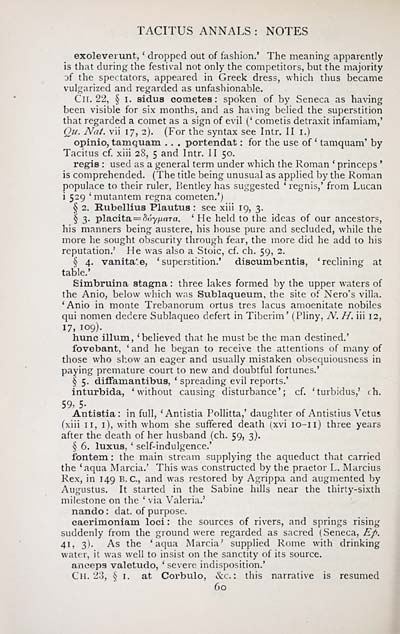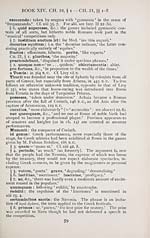Download files
Complete book:
Individual page:
Thumbnail gallery: Grid view | List view

TACITUS ANNALS : NOTES
exoleverunt, ' dropped out of fashion.' The meaning apparently
is that during the festival not only the competitors, but the majority
of the spectators, appeared in Greek dress, which thus became
vulgarized and regarded as unfashionable.
Cli. 22, § I. sidus cometes : spoken of by Seneca as having
been visible for six months, and as having belied the superstition
that regarded a comet as a sign of evil (' cometis detraxit infamiam,'
(2u. Nat. vii 17, 2). (For the syntax see Intr. II i.)
opinio, tamquam . . . portendat : for the use of ' tamquam' by
Tacitus cf xiii 28, 5 and Intr. II 50.
regis : used as a general term under which the Roman ' princeps '
is comprehended. (The title being unusual as applied by the Roman
populace to their ruler, Bentley has suggested ' regnis,' from Lucan
i 529 ' mutantem rcgna cometen.')
§ 2. Rubellius Plautus : see xiii 19, 3.
§ 3. placita=f5oy/iaTa. ' He held to the ideas of our ancestors,
his manners being austere, his house pure and secluded, while the
more he sought obscurity through fear, the more did he add to his
reputation.' He was also a Stoic, cf. ch. 59, 2.
§ 4. vanita'.e, 'superstition.' discumbentis, 'reclining at
table.'
Simbruina stagna : three lakes formed by the upper waters of
the Anio, below which was Sublaqueum, the site of Nero's villa.
'Anio in monte Trebanorum ortus tres lacus amoenitate nobiles
qui nomen dedere Sublaqueo defert in Tiberim' (Pliny, A'. H. iii 12,
17, 109).
hunc ilium, 'believed that he must be the man destined.'
fovebant, ' and he began to receive the attentions of many of
those who show an eager and usually mistaken obsequiousness in
paying premature court to new and doubtful fortunes.'
§ 5. diffamantibus, ' spreading evil reports.'
inturbida, 'without causing disturbance'; cf. 'turbidus,' th.
59, 5-
Antistia: in full, 'Antistia Pollitta,' daughter of Antistius Vctus
(xiii II, i), with whom she suffered death (xvi lo-ii) three years
after the death of her husband (ch. 59, 3).
§ 6. luxus, ' self-indulgence.'
fontem : the main stream supplying the aqueduct that carried
the 'aqua Marcia.' This was constructed by the praetor L. Marcius
Rex, in 149 B.C., and was restored by Agrippa and augmented by
Augustus. It started in the Sabine hills near the thirty-sixth
milestone on the ' via Valeria.'
nando : dat. of purpose.
caerimoniam loci : the sources of rivers, and springs rising
suddenly from the ground were regarded as sacred (Seneca, Ep.
41, 3). As the 'aqua Marcia' supplied Rome with drinking
water, it was well to insist on the sanctity of its source.
anceps valetudo, ' severe indisposition.'
Ch. 23, § I. at Corbvilo, &c. : this narrative is resumed
60
exoleverunt, ' dropped out of fashion.' The meaning apparently
is that during the festival not only the competitors, but the majority
of the spectators, appeared in Greek dress, which thus became
vulgarized and regarded as unfashionable.
Cli. 22, § I. sidus cometes : spoken of by Seneca as having
been visible for six months, and as having belied the superstition
that regarded a comet as a sign of evil (' cometis detraxit infamiam,'
(2u. Nat. vii 17, 2). (For the syntax see Intr. II i.)
opinio, tamquam . . . portendat : for the use of ' tamquam' by
Tacitus cf xiii 28, 5 and Intr. II 50.
regis : used as a general term under which the Roman ' princeps '
is comprehended. (The title being unusual as applied by the Roman
populace to their ruler, Bentley has suggested ' regnis,' from Lucan
i 529 ' mutantem rcgna cometen.')
§ 2. Rubellius Plautus : see xiii 19, 3.
§ 3. placita=f5oy/iaTa. ' He held to the ideas of our ancestors,
his manners being austere, his house pure and secluded, while the
more he sought obscurity through fear, the more did he add to his
reputation.' He was also a Stoic, cf. ch. 59, 2.
§ 4. vanita'.e, 'superstition.' discumbentis, 'reclining at
table.'
Simbruina stagna : three lakes formed by the upper waters of
the Anio, below which was Sublaqueum, the site of Nero's villa.
'Anio in monte Trebanorum ortus tres lacus amoenitate nobiles
qui nomen dedere Sublaqueo defert in Tiberim' (Pliny, A'. H. iii 12,
17, 109).
hunc ilium, 'believed that he must be the man destined.'
fovebant, ' and he began to receive the attentions of many of
those who show an eager and usually mistaken obsequiousness in
paying premature court to new and doubtful fortunes.'
§ 5. diffamantibus, ' spreading evil reports.'
inturbida, 'without causing disturbance'; cf. 'turbidus,' th.
59, 5-
Antistia: in full, 'Antistia Pollitta,' daughter of Antistius Vctus
(xiii II, i), with whom she suffered death (xvi lo-ii) three years
after the death of her husband (ch. 59, 3).
§ 6. luxus, ' self-indulgence.'
fontem : the main stream supplying the aqueduct that carried
the 'aqua Marcia.' This was constructed by the praetor L. Marcius
Rex, in 149 B.C., and was restored by Agrippa and augmented by
Augustus. It started in the Sabine hills near the thirty-sixth
milestone on the ' via Valeria.'
nando : dat. of purpose.
caerimoniam loci : the sources of rivers, and springs rising
suddenly from the ground were regarded as sacred (Seneca, Ep.
41, 3). As the 'aqua Marcia' supplied Rome with drinking
water, it was well to insist on the sanctity of its source.
anceps valetudo, ' severe indisposition.'
Ch. 23, § I. at Corbvilo, &c. : this narrative is resumed
60
Set display mode to: Large image | Transcription
Images and transcriptions on this page, including medium image downloads, may be used under the Creative Commons Attribution 4.0 International Licence unless otherwise stated. ![]()
| Early Gaelic Book Collections > Matheson Collection > Cornelli Taciti annalium > (226) |
|---|
| Permanent URL | https://digital.nls.uk/76569441 |
|---|
| Description | Items from a collection of 170 volumes relating to Gaelic matters. Mainly philological works in the Celtic and some non-Celtic languages. Some books extensively annotated by Angus Matheson, the first Professor of Celtic at Glasgow University. |
|---|
| Description | Selected items from five 'Special and Named Printed Collections'. Includes books in Gaelic and other Celtic languages, works about the Gaels, their languages, literature, culture and history. |
|---|

